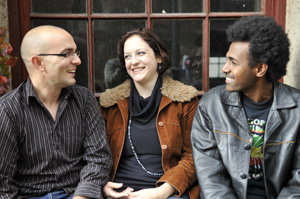Students' software sheds light on dark energy
09 June 2008 |
| Shedding light: The trio of Jacques Kotze, Renee Hlozek, and Yabebal Fantaye have been working closely together. |
Three UCT students have worked together on a group assignment that led to the development of a tool to evaluate the power of future cosmology surveys.
Renee Hlozek, Jacques Kotze and Yabebal Fantaye, with the help of their supervisor, Professor Bruce Bassett, used the Fisher Matrix Formalism to produce the Fisher4Cast software package.
According to Fantaye, this can be used to predict how well future experiments or surveys will do in the quest to understand the nature of dark energy, an elusive form of anti-gravity that appears to be driving the acceleration of the Universe.
"In this way we can compare planned surveys against each other, and look at which surveys will answer certain questions most effectively," explains Hlozek.
Fisher4Cast has been well received and suggestions have been made for further extension.
The students also developed a graphic user interface to make the tool easy to use.
"This opens the way for students and researchers to understand some of the complex issues associated with survey design," says Kotze. "This will impact on our ability to shed light on dark energy."
They each brought unique skills to the task, and benefited from Bassett's guidance.
The three part ways next year, as Hlozek and Fantaye head to the UK and Italy, respectively, to pursue their PhD studies, while Kotze, who is completing his PhD, will be extending his career in the US.
The trio agree that "given the quality of our interaction, we would be eager to keep collaborating in future". Fisher4Cast is OpenSource software, and can be downloaded from here.
 This work is licensed under a Creative Commons Attribution-NoDerivatives 4.0 International License.
This work is licensed under a Creative Commons Attribution-NoDerivatives 4.0 International License.
Please view the republishing articles page for more information.







